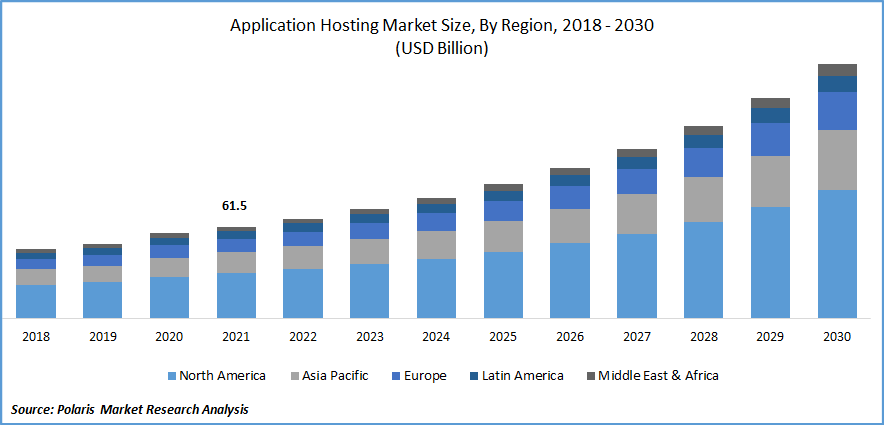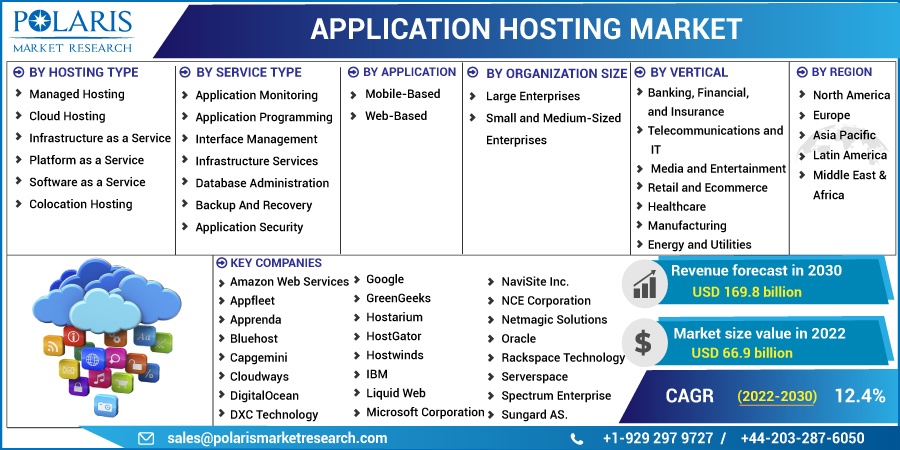
Application Hosting Market Share, Size, Trends, Industry Analysis Report
By Hosting Type; By Service Type; By Application (Mobile-based, Web-based); By Organization Size; By Vertical; By Region; Segment Forecast, 2022 - 2030
- Published Date:Nov-2022
- Pages: 117
- Format: PDF
- Report ID: PM2843
- Base Year: 2021
- Historical Data: 2018-2020
Report Outlook
The global application hosting market was valued at USD 61.5 billion in 2021 and is expected to grow at a CAGR of 12.4% during the forecast period. The growing demand for application hosting is expected to be driven by the consumer shift to e-commerce, mobile technologies advancement, and cloud computing solutions expansion.

Know more about this report: Request for sample pages
The increasing adoption of application hosting across various verticals helps them aid applications hosted online. The advancement in application hosting solutions provides smooth and easy features updates, pay according to modules, and links to hosted apps with existing data. Also, the deployment of these services is lower in cost, which has increased its global demand, which is anticipated to drive market growth.
The COVID-19 pandemic had a positive impact on the growth of the market. Many businesses started operating remotely, leading to increasing broadband connection demand. Additionally, the adoption of innovative technologies in various verticals for e-learning, telemedicine, robotics, and augmented and virtual reality influenced the market growth. Moreover, most companies shifted to e-commerce for a better presence during the pandemic and adopted virtual retail experiences for the customer, boosting the market.
With the advancement and deployment of application hosting across various end-use industries, numerous service providers for these solutions are emerging, creating a lucrative opportunity for the market. Service providers can manage to offer services according to clients’ requirements and under their budget, which is expected to boost market growth. Moreover, small business owners' growing adoption of server hosting is due to its cost-effectiveness, reduction in data loss, and in-built upgraded software, which improves performance; such factors are propelling the market growth.
 Know more about this report: Request for sample pages
Know more about this report: Request for sample pages
Industry Dynamics
Growth Drivers
The global application hosting is likely to be driven by rising demand for cloud-based solutions to reduce the workload of IT management and growing awareness about the benefits of the hosted application. The cloud-hosted application significantly reduces the overhead expenses and infrastructural costs; since it is a rented solution, no investments for infrastructure are required, and fewer systems are needed to manage and support the application, which is expected to fuel the market growth.
In addition, users can access data from anywhere and anytime, and the organization doesn’t have to pay for services that are not required for their operations. Furthermore, resources can be managed according to customer demands. With evolving services and solutions, businesses can upgrade and downgrade the software accordingly, avoiding concerns regarding storage capacities; such factors are boosting market growth.
Many key players are developing their managed services that make database operations easy. For instance, Kinsta launched application and database hosting to run powerful applications, websites, and various services with flexibility and reliability. Moreover, the users could run different programming languages such as python, java, and PHP within minutes and get top-tier results influencing revenue growth.
Report Segmentation
The market is primarily segmented based on hosting type, service type, application, organization size, vertical, and region.
|
By Hosting Type |
By Service Type |
By Application |
By Organization Size |
By Vertical |
By Region |
|
|
|
|
|
|
Know more about this report: Request for sample pages
Managed hosting accounted for the largest share in 2021
Managed hosting segment accounted for the highest revenue share in 2021 as it manages the websites and services of an organization without a huge staff and also reduces the operational cost of businesses as they do not require IT personnel to continuously manage their services. In addition, this offers maximum security and avoids threats of data breaches. It also provides additional features such as automatic backups, website monitoring, dedicated servers, and many more, projected to bolster the market over the forecast period.
Many small-scale enterprises are adopting managed hosting owing to its cost-effectiveness and various subscription facilities, which also support market growth.
Mobile-based application segment is expected to spearhead the market growth
The demand for application hosting in the mobile-based segment is driven by the increased usage of mobile applications, which has tremendously increased the demand for cloud hosting. Many organizations seek to use cloud-based solutions for hosting their application as it eliminates costs incurred by hardware implementation and directly hosts the app in the cloud, which is anticipated to fuel the segment growth.
Furthermore, the mobile-based application requires a robust system as it generates a large amount of data. This data needs to be correctly maintained and stored, which is not feasible by any physical server as it might cause an immense workload. Server hosting reduces the workload of such bulk data. It offers service providers a better experience and exposure to handle such issues, which ultimately increases the efficiency of the enterprise and contributes to the market’s revenue.
Small and medium-sized enterprises are expected to witness faster growth
The demand for application hosting in small and medium-sized enterprises (SMEs) is expected to see a significant surge over the forecast period, as many of these organizations need to be more capable of building a well-established infrastructure and need more resources to manage this infrastructure. Additionally, SMEs require a platform to host their applications and grab consumer attention regarding their services and product offerings. The growing adoption of managed and cloud-based hosting owing to their niche market presence and customized availability depending on the organization size and requirement is the major factor propelling the segment growth.
These advanced technologies empower SMEs to host their applications by leveraging the service providers' infrastructure at affordable rates. These hosting services provide many benefits, including automatic updates, recoveries, and security which reduce the organization's capital expenditure and eventually influence the segment growth.
Retail and E-commerce segment is expected to account for the largest share in 2030
The retail and e-commerce segment is expected to dominate the market over the forecast period owing to the changing lifestyle and consumer shift from in-store to online platforms. The growing adoption of cloud technology by many retailers to grow their online business presence and increase sales is expected to drive segment growth. Additionally, SMEs tend to use cloud computing technologies to increase their online business presence and reputation as it is affordable and reduces infrastructural costs.
Furthermore, managed hosting is also adopted by many e-commerce platforms as consumer share their personal and financial information, which needs to be secured and protected from any cyber threat. These hosting ensure that the website and server are free from cyber-attacks and minimize risks such as hacking and data thefts, bolstering the market growth.
North America dominated the market and is expected to witness fastest growth over the forecast period
North America is the largest region for application hosting. It is expected to witness faster growth over the forecast period owing to the growing adoption of managed and cloud hosting applications and the well-established infrastructure to acquire cutting-edge technologies. In addition, the large presence of collocation data centers and emerging various service providers with novel technologies to enhance the customer experience in the U.S. and Canada is projected to support regional growth.
Asia Pacific is expected to register the highest CAGR over the forecast period owing to the increasing usage of consumer electronics, including tablets, tv, and mobile phones, with the growing population. The rising demand for broadband connectivity is increasing the deployment of 5G connections in China, India, and South Korea. Moreover, the increasing adoption of application hosting in retail and e-commerce across emerging nations is projected to drive regional growth.
Competitive Insight
Some of the major players operating in the global market include Amazon Web Services, Appfleet, Apprenda, Bluehost, Capgemini, Cloudways, DigitalOcean, DXC Technology, Google, GreenGeeks, Hostarium, HostGator, Hostwinds, IBM, Liquid Web, Microsoft Corporation, NaviSite Inc., NCE Corporation, Netmagic Solutions, Oracle, Rackspace Technology, Serverspace, Spectrum Enterprise, and Sungard AS.
Recent Developments
In September 2022: Rackspace technology launched AWS in the Middle East to accelerate innovation and digital transformation in organizations to run their applications and serve end users from data centers in UAE.
In February 2022: IBM acquired Neudesic to expand the portfolio of IBM’s hybris multi-cloud services and also develop the company’s hybrid cloud and AI strategies.
Application Hosting Market Report Scope
|
Report Attributes |
Details |
|
Market size value in 2022 |
USD 66.9 billion |
|
Revenue forecast in 2030 |
USD 169.8 billion |
|
CAGR |
12.4% from 2022 - 2030 |
|
Base year |
2021 |
|
Historical data |
2018 - 2020 |
|
Forecast period |
2022 - 2030 |
|
Quantitative units |
Revenue in USD billion and CAGR from 2022 to 2030 |
|
Segments Covered |
By Hosting Type, By Service Type, By Application, By Organization Size, By Vertical, By Region |
|
Regional scope |
North America, Europe, Asia Pacific, Latin America; Middle East & Africa |
|
Key Companies |
Amazon Web Services, Appfleet, Apprenda, Bluehost, Capgemini, Cloudways, DigitalOcean, DXC Technology, Google, GreenGeeks, Hostarium, HostGator, Hostwinds, IBM, Liquid Web, Microsoft Corporation, NaviSite Inc., NCE Corporation, Netmagic Solutions, Oracle, Rackspace Technology, Serverspace, Spectrum Enterprise, and Sungard AS. |
